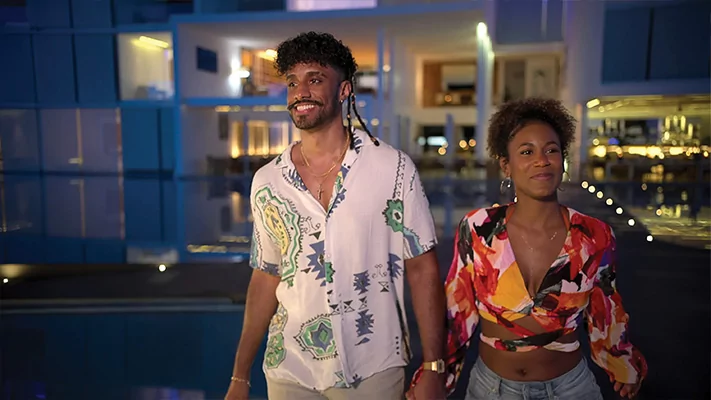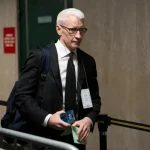
The seventh season of the reality show Love Is Blind promised to deliver a Washington, D.C., experience. In a sense, it did. In typical fashion for the sprawling D.C. metro area, cast members claiming to fall under the shadow of the Capitol hail from cities as distant as Fredericksburg, Virginia, and Baltimore, Maryland. Among participants, there is frequent talk of politics and Rolexes, but not everyone is who he or she appears to be.
For the uninitiated, the show’s premise is simple: Young singles meet each other while in separate “pods,” and they converse but are not allowed to see each other. Once contestants pair off together and get engaged, they see each other for the first time and are whisked away to a tropical vacation to test their physical connection and the show’s premise: that love really is blind. Following the trial by tiki torchlight, the couples are deposited into new apartments, where they see how they live together day-to-day. If all goes well, the couples walk down the aisle weeks later, saying their “I dos” — or, just as often, running away in tears.

D.C. would seem ripe for a reality show that pairs up struggling singles. The capital has more singles than almost any other city in the United States, and over half its population aged 15 or older has never been married. “Dating in Washington is really hard. Is it D.C., or is it me?” says a Washington Post headline from 2015. It’s common to hear locals complain about the dating scene: Liberal women urge their peers to ignore closet Republicans billing themselves as “moderates,” especially those living in the Navy Yard neighborhood (supposedly a right-wing redoubt despite being home to Democratic New York Rep. Alexandria Ocasio-Cortez). Republicans complain that even if they try to reach across the aisle, they can’t get a date, and who could forget when D.C. women flooded the dating apps in search of Jan. 6 rioters?
You can see some of these tensions at the outset of the most recent Love is Blind season, set in D.C., but not as much as you’d think. Stephen, who calls himself a “centrist,” sheepishly admits to being a 2016 Trump supporter but says he “despise[s]” how the former president handled himself in office, and one woman proudly announces that her grandfather was part of the violent black nationalist group Nation of Islam. There is only one cast member who drew boos from the audience at a Love is Blind watch party I attended at Metrobar in D.C. It wasn’t Tyler, who hides from his fiancee that he was the sperm donor to three children. It wasn’t Stephen, who left the show after cheating on his fiancee by exchanging spicy text messages with another woman. No, what drew the ire of the show’s fans was Ramses, who sings the praises of men expressing their emotions, rejecting traditional gender roles, and challenging toxic masculinity before his progressive facade crumbles and he turns out to be just another man breaking a woman’s heart.
Ramses wants his dates to know he’s not like other guys.
“I just don’t really care to, like, try to follow traditional expectations of what, like, masculinity should look like,” he says on an early date with his future fiancee, Marissa. “Masculinity is, like, what I make it.”
From then on, Ramses constantly repeats things to make D.C. women swoon. He says he doesn’t support the military, partly because of the Israel-Palestinian conflict, and spurns his fiancee’s past service in the Navy.
“I always stand with, like, people who are under the hammer of, like, U.S. imperialism,” he says.
In another scene, he argues that “billionaires are unethical.” Whether his beliefs are sincere or expedient in the progressive dating world, it’s clear he knows how to play the game.
However, not well enough, ultimately.
One of the season’s viral dramas unfolds when Ramses and Marissa discuss the possibility of having children. She is fine with a timeline of a couple of years. He wants to wait longer. However, Marissa is adamant that she is not going back on birth control. Ramses, who is surely an adamant supporter of a “woman’s right to choose,” protested that he doesn’t want to, er, use his own protection: “It’s not really enjoyable, baby.”
The audience backlash from this reaction was swift and harsh.
“I was with Ramses on the anti-imperialism, but he’s starting to piss me off,” said one X user with “Decolonize Everything” in her bio. Another viewer chided the show for “the evil men that you put on our screens.” The National Women’s Law Center even took a shot at him in a blog post titled, “Ramses from ‘Love Is Blind’ Proves That If You’re ‘Progressive’ Except for Sex, No You Aren’t.”
All of this drama made Ramses the season villain, overshadowing the scandal of the dubious absentee sperm donor. At least Tyler never pretended to be a feminist. Ramses’s villain arc culminates in his breaking up with Marissa just before their wedding. “I’m just, like, scared that, that something may happen, like, where, like, I end up hurting you,” he says as his reason.
“I just don’t think, like, love alone is, like, enough,” he expounds.
At the D.C. Love is Blind watch party, where Marissa later spoke to the audience to much excitement, this scene elicited a chorus of boos.
It’s always possible, of course, that Ramses suffered in part from the dreaded “bad edit,” in which segments of his comments could be stripped to make him look worse and increase the drama of the show. In the reunion episode, Ramses says he never presented Marissa with a birth control ultimatum: “It wasn’t a situation where I was just being whiny and bratty.”
However, the viewers had already made up their minds about Ramses, probably because he reminds them of a type of man they know all too well. The D.C. women who make up the most enthusiastic audience for this season have met the sort of man who will put “free Palestine” in his Instagram bio and post infographics about the gender pay gap but fail to come to a friend’s aid because he’s “taking time for me.” He has learned to use left-wing language and therapy-speak to get what he really wants.
As the show has proven in previous seasons, love is certainly not blind, but it might have astigmatism. Couples who seem to have chemistry when speaking to each other through a wall often see each other at the reveal and try not to cringe. Most couples find that the show, in addition to testing whether love is blind, tests whether love cultivated in a vacuum can survive in the real world. Sometimes, it can. Season one lucked out with the perfect pair: Lauren and Cameron, a beautiful interracial couple who battle cultural and family differences and make it to the altar on the show, and have remained married since 2018. Often, however, it can’t survive. It’s easy to bond over music taste or even ideology when your entire schedule consists of drinking wine, going on blind dates, and gossiping with your friends about those rendezvous.
CLICK HERE TO READ MORE FROM THE WASHINGTON EXAMINER
However, reality means reconciling your beliefs with someone else’s and realizing that your idealism must either be tested or give way.
Madeline Fry Schultz is the contributors editor for the Washington Examiner.





